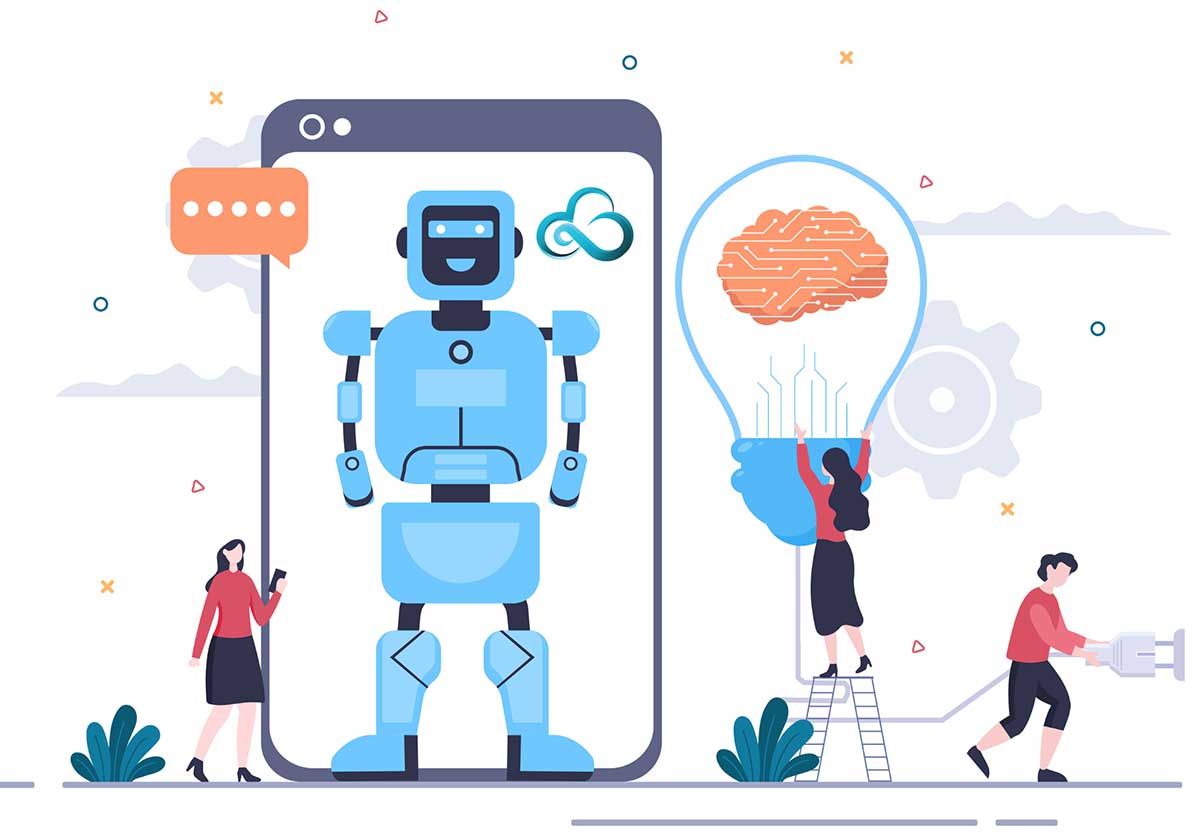Building an AI Team: The Heart of Successful AI Integration

For many Gold Coast businesses, the adoption of artificial intelligence has shifted from being an interesting concept to a practical step towards greater efficiency and innovation. Yet, while the technology is powerful, it cannot deliver its full potential without the right people in place. Artificial Intelligence is not a plug-and-play solution. It requires expertise, strategic thinking, and collaboration to ensure that it is implemented effectively and maintained. Therefore, building an AI team is the most important investment you can make when preparing for AI employees and automation. A dedicated group of professionals with the right combination of skills will be the driving force behind successful AI integration in your organisation.
The importance of building an AI team
Building an Artificial Intelligence team is not simply about hiring a few data specialists. It is about creating a group of people who understand both the technical side of artificial intelligence and the real-world context of your industry. Without this balance, artificial intelligence solutions can end up solving the wrong problems or failing to integrate with existing operations. For Australian businesses in particular, this is critical because the competitive environment often demands that every investment in technology delivers measurable returns. By building an AI team with the right skills and knowledge, you give your business the best chance of making AI a long-term driver of efficiency, innovation, and growth.
When building an AI team, it is important to think about how each role will contribute to achieving the overall objectives. Technical skills are essential, but so too is the ability to translate data-driven insights into practical actions. For example, in the construction sector, AI engineers might develop models to predict delays, while domain experts ensure those models reflect the realities of site work and regulatory requirements.
Building an Artificial Intelligence team also involves fostering collaboration between departments. Marketing, operations, finance, and IT all have unique perspectives that can help identify where AI will deliver the most value. The more connected these functions are, the more likely it is that AI solutions will be implemented smoothly. In this sense, building an AI team is as much about developing internal communication and shared goals as it is about technical expertise. By prioritising both skills and collaboration, Australian companies can ensure that building an AI team becomes a strategic move that strengthens their competitive edge.
Identifying key roles when building an AI team
When building an Artificial Intelligence team, the first step is to identify the range of skills that will be required for your specific goals. These often include data scientists to design and train AI models, AI engineers to integrate those models into production systems, and data engineers to ensure that information flows smoothly from collection to analysis. Domain experts contribute their understanding of the industry’s specific challenges and opportunities, while business stakeholders keep the projects aligned with strategic objectives. Project managers help to coordinate all of these efforts, ensuring that milestones are met and resources are used effectively.
In Brisbane’s construction sector, for example, building an AI team might involve including professionals who understand the details of site operations, supply chain management, and regulatory requirements. This ensures that the AI models developed address real-world challenges, such as predicting project delays or optimising material orders, rather than producing abstract insights that cannot be acted upon.
Another important part of building an AI team is balancing technical skills with communication and problem-solving abilities. A group that can talk openly, share ideas, and adapt to changing requirements is far more likely to deliver value. Building an AI team with a culture of collaboration helps avoid the risk of technical solutions being developed in isolation from operational realities. In sectors like construction, where time pressures are constant, this balance ensures that AI tools can be deployed quickly and used effectively. Building an AI team also means thinking about long-term growth, ensuring the mix of skills will allow the business to expand AI applications into new areas as opportunities arise. By building an AI team with these principles in mind, Australian businesses position themselves for sustainable success.
Fostering collaboration in your AI team
Collaboration is at the heart of building an AI team that works well together. AI projects often require multiple disciplines to share ideas, align priorities, and solve complex problems. This can only happen when there are open lines of communication and a shared commitment to the project’s success. Regular meetings, both in person and through digital channels, help to maintain alignment and allow team members to share progress, challenges, and insights.
Cross-functional work is especially valuable. When a data scientist pairs with a domain expert, the result is often a more refined and relevant AI solution. Similarly, when AI engineers work closely with project managers, deployment is smoother, and potential issues are addressed before they escalate. By building an AI team with a culture of collaboration, you maximise the impact of each individual’s skills and experience.
Building an AI team also requires a deliberate effort to break down silos between departments. In many organisations, technical and operational teams work in isolation, leading to solutions that look good on paper but fail in practice. By building an AI team that blends perspectives from IT, operations, finance, and leadership, you create an environment where solutions are grounded in both technical feasibility and business relevance. Building an AI team with these qualities ensures faster problem resolution, better innovation, and a smoother path from concept to implementation. Over time, building an AI team with strong collaboration habits also strengthens trust, making it easier to take on more ambitious projects and expand AI’s role in the organisation.
Providing training to support building an AI team
The technology behind AI is constantly evolving, which means that building an AI team is not a one-off task. The team’s skills must be maintained and expanded through ongoing training. This can take the form of workshops, internal knowledge-sharing sessions, or enrolment in formal courses and certification programmes.
Training also helps to keep the team motivated and engaged. People who feel that their employer is investing in their professional development are more likely to remain committed to the organisation. In the context of building an AI team, this reduces the risk of losing valuable expertise at a critical stage of your AI strategy.
In practice, building an AI team that remains competitive means anticipating the skills that will be needed in the near future, not just the ones required today. Emerging areas such as generative AI, computer vision, and natural language processing may become increasingly relevant to your business. By building an AI team with access to targeted training in these areas, you ensure that new opportunities can be pursued without delay.
Furthermore, building an AI team that regularly engages with industry events, conferences, and collaborative research projects can help bring fresh ideas and techniques back into the organisation. This outward-looking approach means that building an AI team is about more than maintaining skills—it is about cultivating a culture of curiosity, adaptability, and continuous improvement that will sustain successful AI integration over the long term.
Hiring talent for building an AI team
In some cases, building an AI team will require hiring new talent from outside the organisation. This might be because the skills needed do not exist internally, or because expanding the scope of your AI initiatives demands additional capacity. The recruitment process should be deliberate, with job descriptions that clearly set out expectations, required competencies, and opportunities for growth.
Recruitment channels can range from traditional job boards to AI-focused communities where professionals share projects and ideas. For Australian businesses, building relationships with universities can be an effective way to identify emerging talent before they enter the broader job market. A well-planned hiring strategy ensures that you add people who complement the existing team and bring fresh perspectives.
When building an AI team, it is essential to look beyond purely technical qualifications. Candidates should also demonstrate problem-solving skills, adaptability, and an ability to collaborate across disciplines. Building an AI team with this balance of attributes increases the likelihood that projects will progress smoothly and deliver meaningful results.
For competitive industries such as construction, finance, and retail, building an AI team with both experienced professionals and new graduates can create a healthy blend of innovation and practical expertise. In many cases, building an AI team through staged recruitment—adding roles gradually as needs become clear—can reduce hiring risks and ensure long-term cohesion. The ultimate goal of building an AI team is to create a group that is equipped to turn AI strategy into measurable business impact.
Creating a supportive environment for building an AI team
Even the most skilled team cannot thrive without a supportive environment. This means creating a workplace where innovation is encouraged, and people feel comfortable suggesting new ideas or challenging assumptions. Building an AI team in such an environment requires clear leadership, recognition of achievements, and a willingness to adapt processes based on feedback.
In Brisbane and other Australian cities, where the competition for skilled AI professionals can be strong, providing flexibility, work-life balance, and opportunities for remote collaboration can make your organisation more attractive. A positive work culture helps to retain the team you have worked hard to assemble, ensuring that the knowledge and experience gained stay within the business.
When building an AI team, leaders should ensure that communication is open and that decisions are transparent. People are more engaged when they understand the purpose behind their work and the impact it has on the company’s success. Building an AI team also means providing the tools and resources necessary for experimentation, as well as the time for professional growth.
For long-term success, building an AI team should involve regular team-building activities that strengthen trust and cooperation. Organisations that make building an AI team a priority in both structure and culture are more likely to achieve sustainable results from their AI initiatives. This combination of technical skill and supportive environment is the true foundation for lasting success.
Why Building an AI Team Will Make or Break Your AI Success
Most AI projects never make it past the “cool demo” stage. They stall because there’s no dedicated team to turn concepts into results. An AI team is the engine that takes AI from theory to action — streamlining workflows, slashing costs, and opening new revenue streams. For Brisbane businesses in construction, retail, finance, or manufacturing, this isn’t a nice-to-have. It’s the difference between AI being a buzzword and AI becoming your competitive edge.
Your AI team bridges the gap between experimentation and execution. They take models from testing into real operations, fine-tune performance, and keep knowledge inside your business instead of walking out the door with external contractors. And with a central point of accountability, your projects stay aligned with business goals, resources are managed wisely, and outcomes are measurable.
Book Your AI Strategy Call — Build the Team, Own the Future
AI isn’t plug-and-play. Without the right mix of technical experts, industry specialists, and strategic leaders, your investment risks being wasted. But when you build the right AI team, you set the foundation for every future success — a team that turns AI into a profit-driving, efficiency-boosting advantage your competitors can’t match.
If you’re serious about moving AI from “something you talk about” to “something that transforms your business,” now’s the time to act.
Book your AI Strategy Call today and let’s map out the team, tools, and tactics that will put you miles ahead in your industry.
